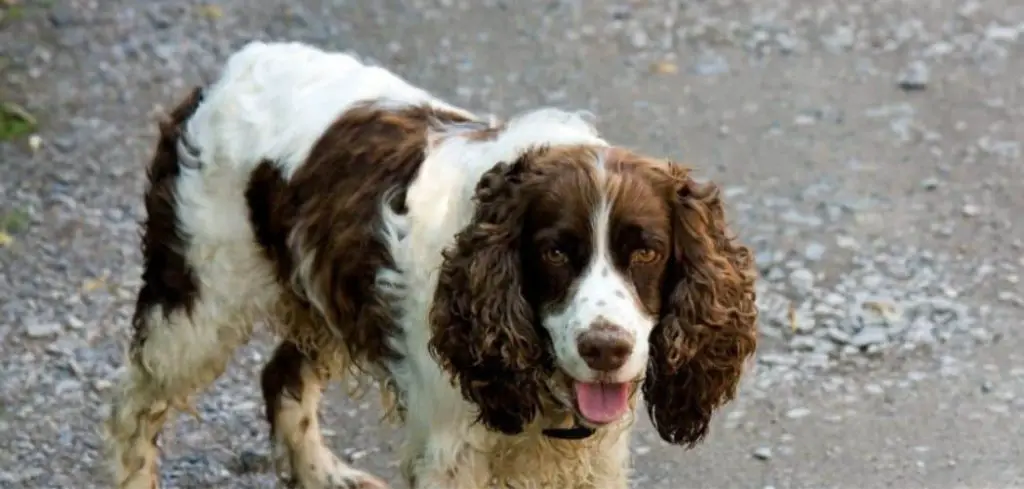Seeing mucus in an old dog’s poop can be worrying, especially since senior dogs are more vulnerable to digestive problems and underlying illnesses.
While mucus is part of the body’s natural defense in the intestines, too much of it in stool often signals a health condition that needs attention.
We outline the common causes of mucus in an old dog’s poop, what you can do at home, and when to seek veterinary help.
Table of Contents
Mucus in Old Dog Poop — Why It Happens
Mucus in an older dog’s poop usually occurs when the intestines are inflamed or irritated. This may happen due to colitis, infections, dietary intolerance, parasites, or more serious conditions like cancer or pancreatitis.
Senior dogs are especially at risk because their immune system is weaker, their digestion is more sensitive, and they are prone to age-related illnesses that can affect bowel health. Sometimes, medication side effects or stress can also lead to mucus in their stool.

Mucus in Old Dog Poop: Common Causes
Colitis
Colitis, or inflammation of the large intestine, is one of the most common causes of mucus in stool. In older dogs, colitis can stem from dietary changes, infections, or chronic illnesses.
The inflammation increases mucus production as the body tries to protect the colon lining.
Dogs with colitis may also strain to poop, have loose stools, or pass small amounts of blood along with the mucus.
Read more: Old Dog Not Eating (Here’s why)
Dietary Intolerance or Sudden Food Changes
Older dogs often have more sensitive stomachs and may not tolerate certain foods as well as when they were younger.
Switching foods too quickly or giving table scraps can irritate their gut. This irritation can lead to excess mucus as the intestines try to flush out the offending ingredient.
You may also notice diarrhea, gas, or a sudden refusal to eat.
Intestinal Parasites
Parasites like whipworms and giardia can cause chronic mucus in an old dog’s poop. Even dogs that have been dewormed earlier in life can become reinfected.
In seniors, parasite-related diarrhea and mucus may be more severe because of weaker immunity. Other signs may include weight loss, lethargy, and a dull coat.
Infections
Bacterial or viral infections can inflame the digestive tract, leading to mucus-laden stools.
While younger dogs often recover faster, infections in seniors can linger and cause dehydration or loss of appetite.
You may notice vomiting, fever, or a sudden decline in energy alongside the mucus.
Pancreatitis
Pancreatitis, or inflammation of the pancreas, is more common in older dogs and can directly affect digestion.
When the pancreas doesn’t function properly, it disrupts the breakdown of food, leading to irritation in the intestines.
This irritation often shows up as mucus in the poop. Dogs with pancreatitis may also vomit, refuse food, and show signs of abdominal pain.
Cancer or Serious Digestive Disorders
Unfortunately, cancer of the intestines or other chronic digestive conditions can also cause mucus in an old dog’s stool.
Tumors and abnormal growths may inflame the bowel or interfere with digestion. While not every case of mucus indicates cancer, persistent or worsening symptoms in an older dog should always be checked by a vet.
What to Do If Your Old Dog Has Mucus in Their Poop
If your senior dog has mucus in their poop once but is otherwise bright and normal, monitor them closely.
Sometimes a mild stomach upset resolves on its own. You can offer bland food, such as boiled chicken and rice, to ease irritation.
Make sure your dog stays hydrated, as older dogs dehydrate faster than younger ones. Encourage small, frequent sips of water throughout the day. Avoid giving new treats or sudden food changes, as these can make the problem worse.
If your dog is on medication, review the possible side effects with your vet, since some drugs can irritate the stomach and intestines.
Keeping a stool diary can also help you track changes and give your vet valuable information.
When to Call or Visit Your Vet
If mucus in your old dog’s poop continues for more than a couple of days, or if it appears frequently, it’s time to call your veterinarian. Older dogs are less resilient, and what might be minor in a young pup can be more serious in a senior.
Seek immediate veterinary care if your dog also shows blood in the stool, vomiting, significant loss of appetite, or signs of pain. Rapid weight loss, weakness, or signs of dehydration—like sunken eyes or dry gums—are also red flags.
For senior dogs with underlying conditions such as pancreatitis, kidney disease, or cancer, even small digestive changes should be taken seriously.
Read more: Mucus in Dog Poop from Stress (Why it happens)
Key Takeaway
Finding mucus in an old dog’s poop can be unsettling, but it’s not always a sign of something severe.
Still, senior dogs are more fragile, and persistent or worsening symptoms should never be ignored. Monitoring their diet, hydration, and overall behavior will give you important clues.
The best approach is to stay observant, provide supportive care at home when it’s mild, and seek veterinary help promptly if other concerning signs appear.
With early attention, many causes of mucus in stool can be managed, helping your old dog stay comfortable and healthy.
